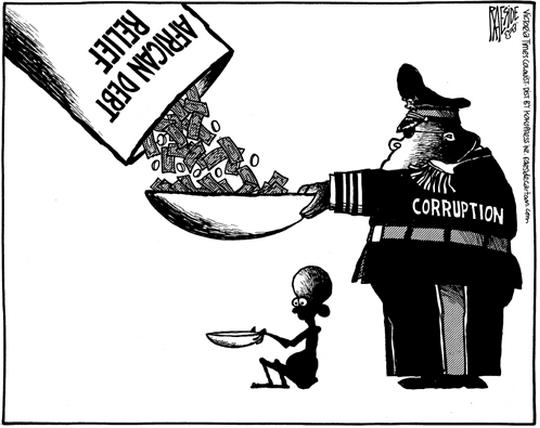The United States, being a powerful and strong nation, is often the main contributor of foreign aid to developing nations. President Barack Obama, believing that aid is a vital part of international affairs, has even allocated funds from national defense to foreign countries. [ref]Michael Warren, “Obama: Reallocate Defense Resources to Foreign Aid,” February 19, 2015, accessed August 17, 2015, http://www.weeklystandard.com/blogs/obama-reallocate-defense-resources-foreign-aid_845409.html.[/ref] However, Opponents to foreign aid like Ron Paul summed up foreign aid as, “taking money from poor people in this country and giving it to rich people in poor countries.”[ref]“Ron Paul: Foreign Aid Takes Money From Poor In U.S., Given To Rich,” accessed August 16, 2015, http://www.realclearpolitics.com/video/2011/10/18/ron_paul_foreign_aid_takes_money_from_poor_in_us_given_to_rich.html.[/ref] Indeed, at a time when the national debt is currently at eighteen trillion, America needs to focus on restructuring the economy, rather than foreign aid.[ref]”U.S. National Debt Clock: Real Time,” accessed August 17, 2015, http://www.usdebtclock.org[/ref] In fact, giving much needed money to other countries during this delicate time simply seems irresponsible. The vendetta is trying to maintain foreign relations while being fiscally responsible.
Echoing similar sentiments as Obama, those who advocate for foreign aid argue it is vital to the economic development of many developing nations. Millions of children in Africa, for instance, are alive today due to the control of measles through vaccinations. Furthermore, hundreds of thousands of more lives in Africa have been saved from HIV/AIDS, as well as malaria, thanks to a combined effort of the U.S., and other richer countries.[ref] Charles Abugre, “Why Foreign Aid Is Important for Africa,” CNN, August 13, 2010, accessed August 16, 2015, http://www.cnn.com/2010/OPINION/08/13/aid.africa.abugre[/ref] In the case of Tanzania, foreign aid has even assisted with road, water, and sanitation projects, which has helped five million people, and created an estimated economic growth of over one billion dollars.[ref]James Glassman, “Foreign Aid: The Good And Bad,” Forbes, April 8, 2011, accessed August 17, 2015, http://www.forbes.com/sites/jamesglassman/2011/04/08/foreign-aid-the-good-and-bad[/ref]
Yet reports suggest that aid to Africa only alleviates the symptoms to their problem, and is not sustainable in the long run. Many african nations still pay close to twenty billion dollars in debt repayments per year. Jeffrey Winters, a professor at Northwestern University, claims that a hundred billion dollars of loans, that was intended for development, had instead gone into corrupt bloated bureaucracies instead.[ref]Dambisa Moyo, “Why Foreign Aid Is Hurting Africa,” WSJ, March 21, 2009, accessed August 16, 2015, http://www.wsj.com/articles/SB123758895999200083.[/ref] A recent study in Nigeria, for instance, revealed that there were fiscal leakages in the form of corruption present in their economy.[ref]Daud Mustafa, Abdul-Hakeem Kilishi, and Sa’ad Akanbi, “Corruption and Foreign Aid Nexus in the African Continent: An Empirical Analysis for Nigeria,” Journal of Economics and Sustainable Development 6 (2015).[/ref] Besides Nigeria, reports revealed that bureaucracies in Congo sold donated food supplies, and used the profit to purchase an arms factory in Italy. In another example, Zimbabwe’s leader Robert Mugabe has been known to take extravagant shopping trips to Harrod’s, a department store. Despite the fact that Mugabe uses systematic violence to stay in power, foreign aid continues to be sent to Zimbabwe.[ref]James Peron, “The Sorry Record of Foreign Aid in Africa,” Foundation for Economic Education, August 1, 2001, Accessed August 17, 2015, http://fee.org/freeman/the-sorry-record-of-foreign-aid-in-africa.[/ref]
Interestingly enough, the majority of studies also reveal that foreign aid has no relationship with investment and growth in developing countries. In fact, foreign aid can even prove harmful to the receiving country. Ethiopia, while initially was supposed to receive short-term humanitarian aid, eventually came to depend on international assistance, and is now dependent on the donating countries. Food aid, in particular, resulted in a loss of local markets, which may have contributed to Ethiopia’s decreased average income from $190 in 1984, to $108 in 2005.[ref]Gaetano Venezia, “The Failings of Foreign Aid and Our Obligation to Consume,” (2015). Senior Honors Theses. Paper 69.[/ref] Similarly, in Nairobi, food aid has actually caused more harm than good. Despite the fact that forty-five million dollars a year in federal funding is spent on food aid, what actually happens is that the food sent from America takes away the business of struggling local farmers.[ref]Celia Dugger, “Charity Finds That U.S. Food Aid for Africa Hurts Instead of Helps,” The New York Times, August 14, 2007, accessed August 17, 2015, http://www.nytimes.com/2007/08/14/world/americas/14iht-food.4.7116855.html?pagewanted=all.[/ref]
The answer to maintaining foreign relations is not aid, but international trade. Opening trade channels with other countries can increase the Gross Domestic Product (GDP) of involved countries. The Centre d’Etudes Prospectives et d’Informations Internationales (CEPII) estimated that trade liberalization, along with trade facilitation, could produce $550 billion in worldwide gains, which is about .8 percent of the world’s GDP. Other alternatives include opening immigration channels as well. Some studies estimate that removing global migration barriers could result in a fifty to one hundred fifty percent increase in world GDP. These gains would not only help the families that are immigrating, but can also assist family members that remain in their home countries through reparations.[ref]Gaetano Venezia, “The Failings of Foreign Aid and Our Obligation to Consume,” (2015). Senior Honors Theses. Paper 69.[/ref] While it is not a guarantee that either one could work to solve the problems around the world, these methods provide more opportunity than foreign aid. It’s time that America gives up trying to be the caring parent for other nations, and instead act as an equal partner in free trade and immigration.
Take Action:
This petition, to be sent to congress, is a call to end all foreign aid.
This petition, which will also be sent to Capitol Hill, urges the government to end foreign aid to Libya, Egypt, and Pakistan.




